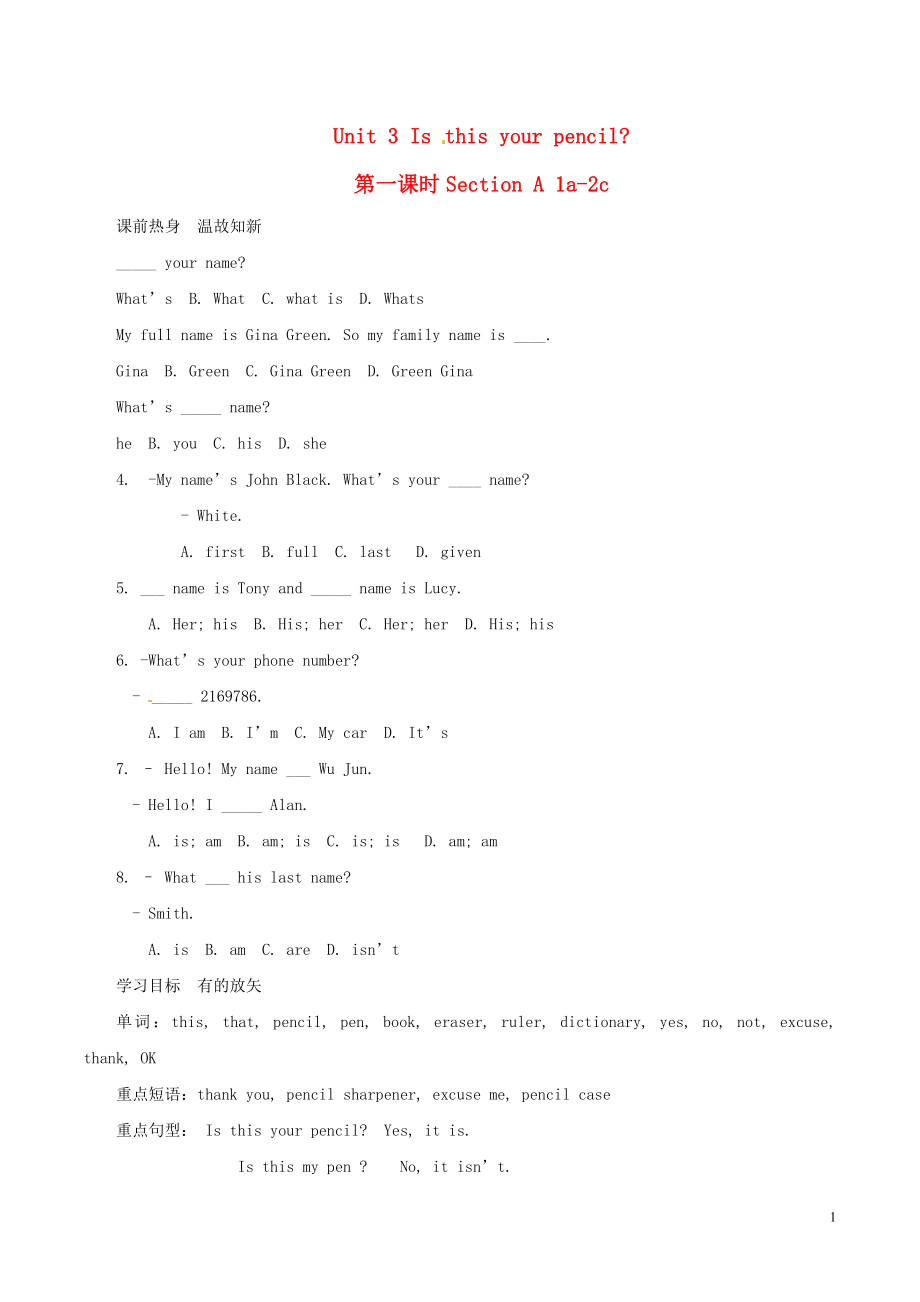《2013年秋七年級(jí)英語(yǔ)上冊(cè) Unit 3 Is this your pencil(第一課時(shí))Section A 1a-2c導(dǎo)學(xué)案(無(wú)答案)(新版)人教新目標(biāo)版》由會(huì)員分享����,可在線閱讀�����,更多相關(guān)《2013年秋七年級(jí)英語(yǔ)上冊(cè) Unit 3 Is this your pencil(第一課時(shí))Section A 1a-2c導(dǎo)學(xué)案(無(wú)答案)(新版)人教新目標(biāo)版(3頁(yè)珍藏版)》請(qǐng)?jiān)谘b配圖網(wǎng)上搜索����。
1�、
Unit 3 Is this your pencil?
第一課時(shí)Section A 1a-2c
課前熱身 溫故知新
_____ your name?
What’s B. What C. what is D. Whats
My full name is Gina Green. So my family name is ____.
Gina B. Green C. Gina Green D. Green Gina
What’s _____ name?
he B. you C. his D. she
4. -My name’s John Black. W
2����、hat’s your ____ name?
- White.
A. first B. full C. last D. given
5. ___ name is Tony and _____ name is Lucy.
A. Her; his B. His; her C. Her; her D. His; his
6. -What’s your phone number?
- _____ 2169786.
A. I am B. I’m C. My car D. It’s
7. – Hello! My name
3、 ___ Wu Jun.
- Hello! I _____ Alan.
A. is; am B. am; is C. is; is D. am; am
8. – What ___ his last name?
- Smith.
A. is B. am C. are D. isn’t
學(xué)習(xí)目標(biāo) 有的放矢
單詞:this, that, pencil, pen, book, eraser, ruler, dictionary, yes, no, not, excuse, thank, OK
重點(diǎn)短語(yǔ):thank you, pencil shar
4���、pener, excuse me, pencil case
重點(diǎn)句型: Is this your pencil? Yes, it is.
Is this my pen ? No, it isn’t.
Is that his book? Yes, it is.
Is that her eraser? No, it isn’t.
指點(diǎn)迷津 授之以漁
同學(xué)們應(yīng)能熟練運(yùn)用動(dòng)詞be的一般疑問(wèn)句及答語(yǔ),并了解動(dòng)詞be的否定形式����;掌握不定冠詞a, an的用法;在指示遠(yuǎn)近上區(qū)分this和t
5���、hat���。
教學(xué)流程
一 未雨綢繆
1.預(yù)習(xí):學(xué)習(xí)目標(biāo)就是預(yù)習(xí)內(nèi)容�����。
2.小試牛刀
預(yù)習(xí)檢測(cè):
I.用a, an, the 填空
1. – Is this ___ English car?
- No, it’s ___ Chinese car.
2. Look, that is ____ egg, and it is ___big egg.
3. ____ sun (太陽(yáng)) is in the sky (天空).
II.單項(xiàng)選擇:
- ____book in your schoolbag?
- Yes, it is.
A. Is your B.
6��、What’s this C. Is it D. How are
2. – Is that your eraser?
- ______.
A. No, it’s my eraser B. Yes, it is C. No, that isn’t D. Yes, it’s your eraser
3. This is ___ room (房間)
A. my B. my a C. my an D. a my
4. – Is this your eraser?
- No, it isn’t. I think _____.
A. it her eraser
7���、B. its her eraser. C. it’s her eraser D. it’s my eraser
5. - ___ you Tony Brown?
- No, my name ___ Nick Brown.
A. Is; is B. Is; am C. Are; am D. Are; is
二 課堂探究
1.自主學(xué)習(xí)
根據(jù)句意及漢語(yǔ)提示,完成單詞���。
1. – What’s this in English?
- It’s a _______ (鉛筆).
2. – Is this your ______ (橡皮)��?
- Yes, it ___
8����、_.
3. – Do you have (有) a ________ (字典)��?
- Yes, I do.
4. My ____ (尺子) is yellow. His is blue.
5. ____ _____(請(qǐng)?jiān)?, is this your ____ (鋼筆)����?
2.合作探究(兵教兵)
句型轉(zhuǎn)換:(1). That is his book. (變?yōu)橐话阋蓡?wèn)句并做肯定和否定回答)
(2).This is my pen. (變?yōu)橐话阋蓡?wèn)句并做肯定和否定回答,而且要改為否定句)
3.質(zhì)疑解疑
含Be的陳述句變一般疑問(wèn)句技巧:將一個(gè)陳述句變成一般疑問(wèn)句通常
9、遵循三變一換原則����,那么三變一換原則又指什么呢����?一換:將陳述句中的主語(yǔ)與be位置交換��,也就是說(shuō)把be(am, is, are)提到句首���。三變:1.將am�,is�����,are的第一個(gè)字母由小寫(xiě)變?yōu)榇髮?xiě)形式�����。2.將陳述句中第一個(gè)單詞的字母由大寫(xiě)變?yōu)樾?xiě)形式��。3.將句號(hào)變成問(wèn)號(hào)���。例如:The girls are students. 變成一般疑問(wèn)句為:Are the girls students? (注意:若含有第一人稱(chēng)的陳述句變一般疑問(wèn)句�����,在按照三變一換原則做題的同時(shí),一般把第一人稱(chēng)改為第二人稱(chēng)�����。例如:This is my coat. →Is this your coat? I am in Class Th
10����、ree. →Are you in Class Three?) 我們已經(jīng)學(xué)會(huì)了有關(guān)Be動(dòng)詞的陳述句變一般疑問(wèn)句的用法。那么一般疑問(wèn)句的答語(yǔ)又如何呢��?告訴你幾條規(guī)律:1.要用Yes或No來(lái)回答����。2.Yes或No其后緊跟主語(yǔ)����,若主語(yǔ)是一些名詞(如their friends, his sister等)����,要把它們變成相應(yīng)代詞(如將their friends變?yōu)閠hey, his sister變?yōu)閟he)�。3.最后加上與這些代詞相對(duì)應(yīng)的Be動(dòng)詞����。若為否定形式�,則還需在Be動(dòng)詞后加not�。例如:Is she a student? 肯定回答為:Yes, she is. 否定回答為:No, she isn’t. Is her mother a nurse? 肯定回答為:Yes, she is. 否定回答為:No, she isn’t. 注意:若一般疑問(wèn)句的主語(yǔ)為第二人稱(chēng)����,答語(yǔ)中的主語(yǔ)要改為第一人稱(chēng)。例如:Are you a worker? 肯定回答為:Yes, I am. 否定回答為:No, I am not.
3
 2013年秋七年級(jí)英語(yǔ)上冊(cè) Unit 3 Is this your pencil(第一課時(shí))Section A 1a-2c導(dǎo)學(xué)案(無(wú)答案)(新版)人教新目標(biāo)版
2013年秋七年級(jí)英語(yǔ)上冊(cè) Unit 3 Is this your pencil(第一課時(shí))Section A 1a-2c導(dǎo)學(xué)案(無(wú)答案)(新版)人教新目標(biāo)版

